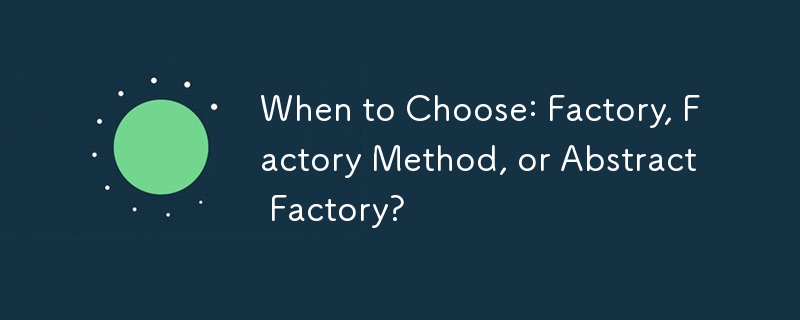Home >Java >javaTutorial >When to Choose: Factory, Factory Method, or Abstract Factory?
When to Choose: Factory, Factory Method, or Abstract Factory?
- Susan SarandonOriginal
- 2024-11-02 05:49:02749browse

Understanding the Differences Between Factory, Factory Method, and Abstract Factory Design Patterns
When creating objects within your code, utilizing design patterns such as Factory, Factory Method, and Abstract Factory can enhance flexibility and reduce coupling. However, these patterns can be confusing.
Factory Pattern
The Factory pattern serves as a "simplified version of Factory Method." It creates objects without exposing the instantiation logic to the client. This approach provides a centralized location for object creation, ensuring consistency and allowing for easy modification of the creation process.
Factory Method Pattern
The Factory Method pattern establishes an interface for creating objects while delegating the actual instantiation to subclasses. This allows for a single interface that supports multiple concrete implementations. This pattern enables flexibility and customization within a system.
Abstract Factory Pattern
The Abstract Factory pattern provides an interface for creating a family of related objects without specifying their specific classes. This pattern is commonly employed for dependency injection scenarios, allowing for easy switching between different product family implementations.
When to Use Each Pattern
- Factory: Use when you want to centralize object creation and reduce coupling with concrete classes.
- Factory Method: Use when you need to provide a common interface for object creation but allow subclasses to customize the actual implementation.
- Abstract Factory: Use when you need to create a family of related objects with varying implementations and maintain consistency within that family.
Java Examples
<code class="java">// Factory
class FruitFactory {
public Apple makeApple() { return new Apple(); }
public Orange makeOrange() { return new Orange(); }
}
// Factory Method
abstract class FruitPicker {
protected abstract Fruit makeFruit();
public void pick() { Fruit f = makeFruit(); ... }
}
class OrangePicker extends FruitPicker {
protected Orange makeFruit() { return new Orange(); }
}
// Abstract Factory
interface PlantFactory {
Plant makePlant();
Picker makePicker();
}
class AppleFactory implements PlantFactory {
public Plant makePlant() { return new Apple(); }
public Picker makePicker() { return new ApplePicker(); }
}</code>The above is the detailed content of When to Choose: Factory, Factory Method, or Abstract Factory?. For more information, please follow other related articles on the PHP Chinese website!

